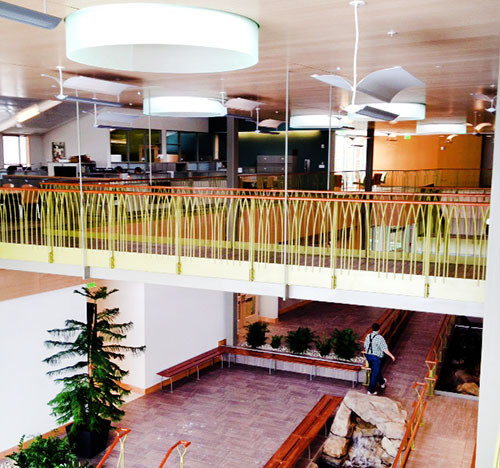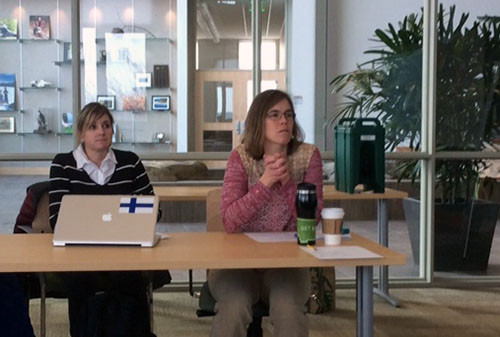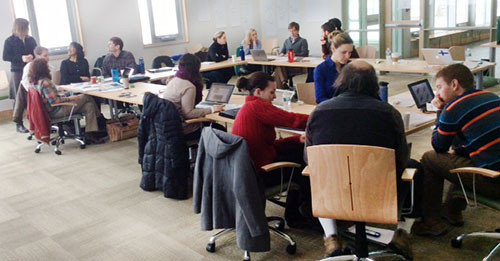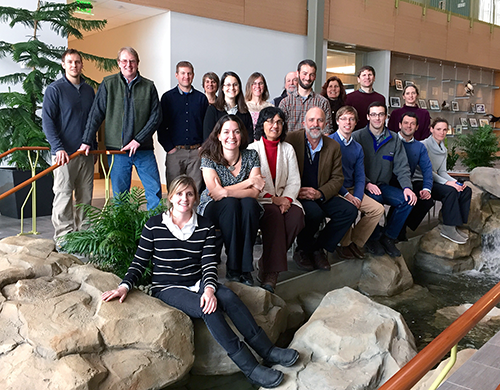Talking about moose and climate change in snowy Massachusetts
Bill Dennison · | Science Communication | Applying Science |Brianne Walsh and I traveled to Westborough, Massachusetts for a scientific synthesis workshop on climate change and moose in the North Woods of Northeastern U.S. The workshop was located at an amazing new facility which serves as the field headquarters for MassWildlife (Massachusetts Division of Fisheries and Wildlife). This building was opened last autumn and is a zero-net-energy building which includes an artificial trout stream stocked with brook trout in the atrium. I was tempted to do a bit of fishing until I saw that the conference room across the atrium from us was full of Massachusetts Environmental Police.

Westborough is about a 45 minute drive from Boston, which was fairly central for the assembled scientific experts from Maine, New Hampshire, Vermont, Massachusetts and New York. There were four of us traveling from the Washington, D.C. region, Shawn Carter and Laura Thompson from US Geological Survey (USGS) in Reston, VA and the two of us Marylanders. Massachusetts recently set a record for the amount of snow accumulated over a ten day period, and it was interesting navigating between walls of snow lining the roads. Delayed flights and heavy traffic made it difficult but not impossible to get around.
This workshop was the first of a series of gatherings to develop scenario planning for climate change, and was facilitated by Dr. Erika Rowland with the Wildlife Conservation Society (WCS), based in Maine. Erika and I are both alumni of the University of Alaska at Fairbanks and I recently toured New York Aquarium which is operated by the Wildlife Conservation Society, so I felt a kinship to her right away.

We started off with four superb talks about moose, climate change and the North Woods by Dave Wattles, Tony D'Amato, Bill Deluca and Alex Bryan. We then started to talk about the complex interactions between moose, moose pests and parasites (winter ticks, brain worms and liver flukes), forestry practices, climate change, and land use. The workshop participants were very knowledgable and totally engaged even though we could gaze out the big windows on the drifting snow outside. It was an appropriate setting to be talking about these majestic boreal animals.
I learned some interesting moose facts like the following: moose sleep leaning up against trees; moose biologists put radio collars on moose by using a spotter plane to locate moose in the winter, direct a helicopter to the site, the helicopter uses a net gun to capture the moose, allowing the biologists to jump out, blindfold and hobble the moose and then place the radio collar on the animal; moose are good swimmers and they can dive underwater to eat aquatic plants; winter ticks attached to moose can suck out half their blood volume and kill the animal; moose populations soared in the industrial forestry of Maine which results in forest regeneration, providing abundant moose food.

Brianne had produced some conceptual diagrams to kick off the conversation and we began developing some interesting future scenarios with catchy titles like 'The Hunger Games', 'Tick, tick, tick . . .Boom!', 'Slow and Steady' and 'Moose Nirvana'. These scenarios involved developing a narrative of potential outcomes of the synergistic factors of climate change and forest conditions on moose. It was great to have so much relevant expertise assembled with broad experience and interesting backgrounds.
We are going to produce a 4 pp. workshop synthesis newsletter, conduct a webinar or webinar series to involve additional expertise from beyond the region, and begin a conversation with the resource managers. We began developing conceptual diagrams to characterize various different scenarios which will enhance the communication and understanding of scenarios and aid in the scenario planning process.
Engaging with this scenario planning process should prove to be an interesting new venture for the Simon Costanzo was originally scheduled to attend this workshop, but we swapped trips and he went to Cali, Columbia for a WWF workshop on the Orinoco River so that I could attend an UMCES Executive Council meeting and join my Science for Environmental Management class via an interactive video connection. It will be interesting to compare notes about these divergent, simultaneous IAN activities.

As part of the workshop wrap up, I wrote the following short poem:
Climate Change and the Moose
William C. Dennison
Climate change is playing havoc with the moose
Shorter, warmer, wetter winters
And hot, dry summers punctuated by storms
Is really cooking the moose's goose.
Winter ticks attaching like a noose
With brain worms and liver flukes
Making this mobile adaptable generalist
Into an anemic and miserable moose.
Industrial forestry was good for the moose
With regenerating forest providing fodder
And well fed animals making babies
Letting the population growth loose.
Our workshop was about climate affects on moose
Developing scenarios with uncertainty and risk
Throughout the Northeast U.S.
So that climate impacts we could deduce.
About the author
Bill Dennison

Dr. Bill Dennison is a Professor of Marine Science and Vice President for Science Application at the University of Maryland Center for Environmental Science.